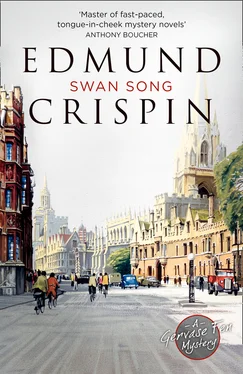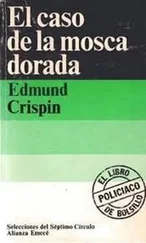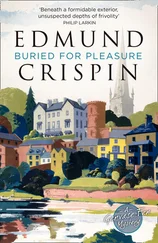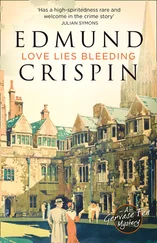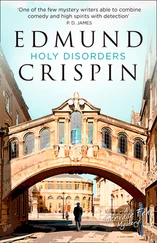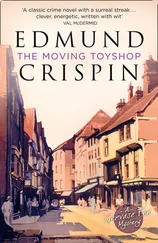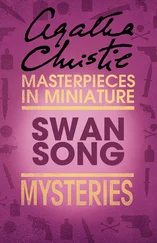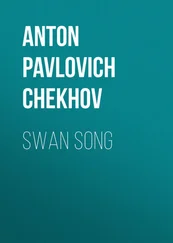She was sitting, small, demure, cool, and self-possessed, on a red plush seat in the centre of the front row of the stalls. Framed in the large rococo splendours of the opera-house like a fine jewel in an antique setting. Tier upon gilded tier of boxes and galleries, radiating on either side from the royal box, towered into the upper darkness. Callipygic Boucher cherubs and putti held lean striated pillars in a passionate embrace. The great chandelier swayed fractionally in a draught, its crystal pendants winking like fireflies in the light reflected from the stage. And Adam paused, daunted. The mise-en-scène was by no means appropriate to the intimate things which he had to say. He consulted first his watch and then the state of affairs on the stage, saw that the rehearsal would be over in half an hour at most, and invited Elizabeth out to a late dinner.
They went to a restaurant in Dean Street, and sat at a table with a red-shaded lamp in a stuffy downstairs room. A small, garrulous, mostly unintelligible Cypriot waiter served them. Adam ordered, with stately deliberation, some very expensive claret, and Elizabeth’s spirits rose perceptibly. Since it was obvious that the well-intentioned nagging of their waiter would be unpropitious to confidences, Adam deferred the business of the evening until the arrival of coffee forced the waiter at last to go away. He then embarked on the subject overhastily and without sufficient premeditation.
‘Elizabeth,’ he said, ‘I hear – that is to say, I understand – that is to say that my feelings – what I mean is—’
He stopped abruptly, dumbfounded at so much feebleness and incoherence, and drank the whole of his liqueur at a gulp. He felt like a man who has incomprehensibly lost his nerve on the middle of a tight-rope. Elizabeth experienced a transient exasperation at being kept for so long in suspense; certainly the omens were favourable, but one could not be completely sure …
‘Adam dear,’ she replied gently, ‘what on earth are you trying to say?’
‘I am trying to say,’ Adam resumed earnestly, ‘that – that I’m in love with you. And that I should like you to marry me. To marry me,’ he repeated with unwarranted ferocity, and sat back abruptly, gazing at her with open defiance.
Really, thought Elizabeth, one would imagine he was challenging me to a duel. But oh, Adam, my darling, my unspeakably shy and precious old idiot … With the utmost difficulty she resisted the temptation to throw herself into his arms. She soon observed, however, that the Cypriot waiter was once again looming, toothily affable, on to their horizon, and decided that the situation had better be dealt with as quickly as possible.
‘Adam,’ she said with a gravity which she was far from feeling, ‘I wish I could tell you how grateful I am. But you know, it isn’t the sort of thing one ought to decide on the spur of the moment … May I think about it?’
‘Any more liqueur, eh?’ said the waiter, materializing suddenly beside them. ‘Drambuie, Cointreau, Crème-de-Menthe, nice brandy?’
Adam ignored him; now that the worst was over he had recovered much of his self-possession.
‘Elizabeth,’ he said, ‘you’re being hypocritical. You know perfectly well that you’re going to marry me.’
‘Green Chartreuse, nice Vodka—’
‘Will you go away. Elizabeth, my dear—’
‘You like the cheque, eh?’ said the waiter.
‘No. Go away at once. As I was saying—’
‘Oh, pay the bill, darling,’ said Elizabeth. ‘And then you can take me outside and kiss me.’
‘Kiss ’er ’ere,’ said the waiter, interested.
‘Oh, Adam, I do adore you,’ said Elizabeth. ‘Of course I’ll marry you.’
‘Nice magnum of champagne, eh?’ said the waiter. ‘Congratulations, sir and madam. Congratulations.’ Adam tipped him recklessly and they departed.
For their honeymoon they went to Brunnen. Their rooms at the hotel overlooked the lake. They visited the Wagner-museum at Triebschen, and Adam, in defiance of all the regulations, played the opening bars of Tristan on Wagner’s Erard piano. They purchased a number of rather risqué postcards and sent them to their friends. Both of them were blissfully happy.
They stood on their balcony gazing across the water, now amethyst-coloured in the fading light.
‘ How nice,’ said Elizabeth judicially, ‘to have all the pleasures of living in sin without any of the disadvantages.’
The marriage would have been no more noteworthy than ten thousand others had it not been for a third party who was obliquely involved.
Edwin Shorthouse was singing Ochs in Der Rosenkavalier . Like Adam, he became acquainted with Elizabeth during the rehearsals. And he, too, fell in love with her.
‘Love’, as used in this connexion, is largely a euphemism for physical excitement. To the best of everyone’s knowledge, Edwin Shorthouse’s affairs with women had never risen above this plane. His habits suggested, in fact, a belated attempt to revive the droit de seigneur, and his resemblance to the gross and elderly roué of Strauss’s opera was sufficiently remarkable for it to be a subject of perpetual surprise in operatic circles that his interpretation of the role was so inadequate. Possibly he himself was uneasily conscious of the similarity, and felt the basic stupidity of Hofmannsthal’s creation to be a reflexion on his own way of life. Sensitivity, however, was not Edwin Shorthouse’s most outstanding trait, and it is more likely that his aversion to the part was instinctive.
There may have been something more than mere sensuality in his attitude to Elizabeth. Certainly it is difficult, on any other hypothesis, to account for the active malevolence which Elizabeth’s marriage to Adam aroused in him. Joan Davis held the view that it was his vanity which was chiefly concerned. Here was Edwin (she said); coarse-grained, middle-aged, ill-favoured, conceited, and almost continually drunk; and here, on the other hand, was Adam. The choice, to anyone but Shorthouse himself, must have seemed a foregone conclusion: to him it had undoubtedly been a wounding blow.
‘But don’t worry, my dears,’ Joan added. ‘Edwin’s concern is with the female form divine – not with particular women. As soon as another shapely girl comes along – and the world’s full of them – he’ll forget his tantrums.’
Elizabeth herself suggested frustration as the cause of Shorthouse’s immoderate annoyance. She had not seen a great deal of him at rehearsals, though whenever they met he had been markedly attentive.
‘I noticed that,’ said Joan. ‘He was always “undressing you with his eyes”, as the absurd phrase has it.’
Elizabeth agreed. But – she added – it had been difficult to deal with this attitude until the evening when Shorthouse had made efforts to transfer his somewhat cheerless imaginative pastime to the realm of actuality.
‘Naturally,’ Elizabeth concluded demurely, ‘I didn’t encourage him … Hence, as I say, he’s frustrated. That’s the answer.’
Adam had yet another theory. In his opinion, Shorthouse was really in love; within his opulent and unprepossessing frame, Adam maintained, there burned the flame which had destroyed Ilium and held Antony in sybaritic bondage by the Nile. ‘In other words, l’amour,’ said Adam. ‘More Levantine than spiritual, I agree, but, none the less, the genuine article.’
Читать дальше
